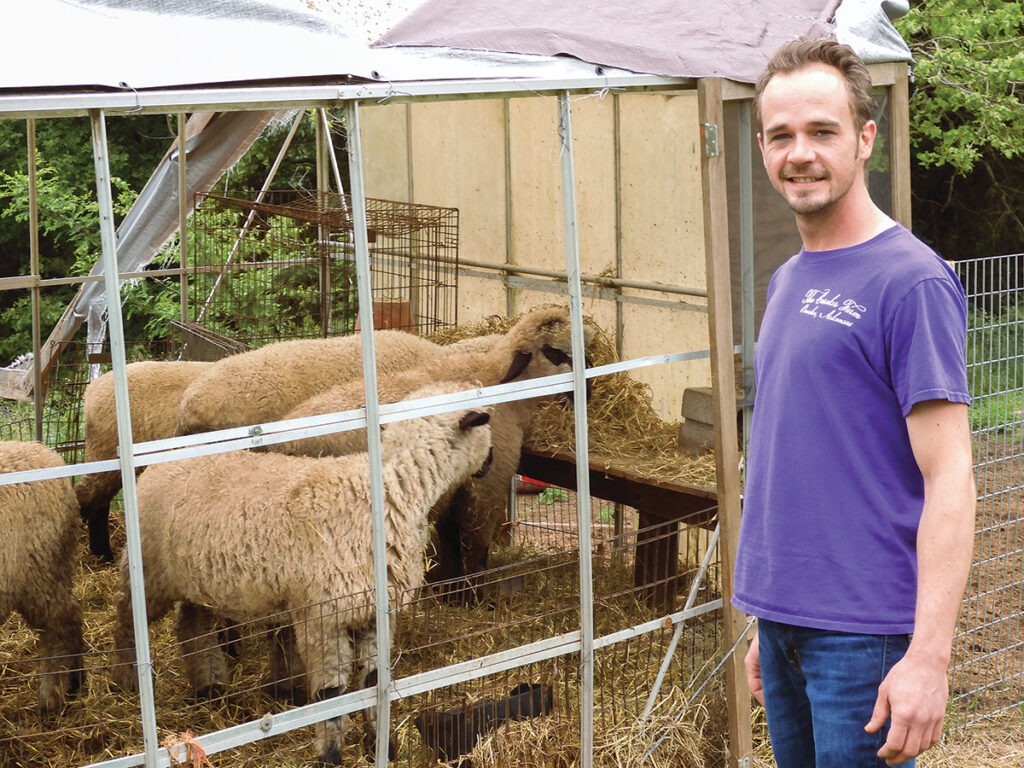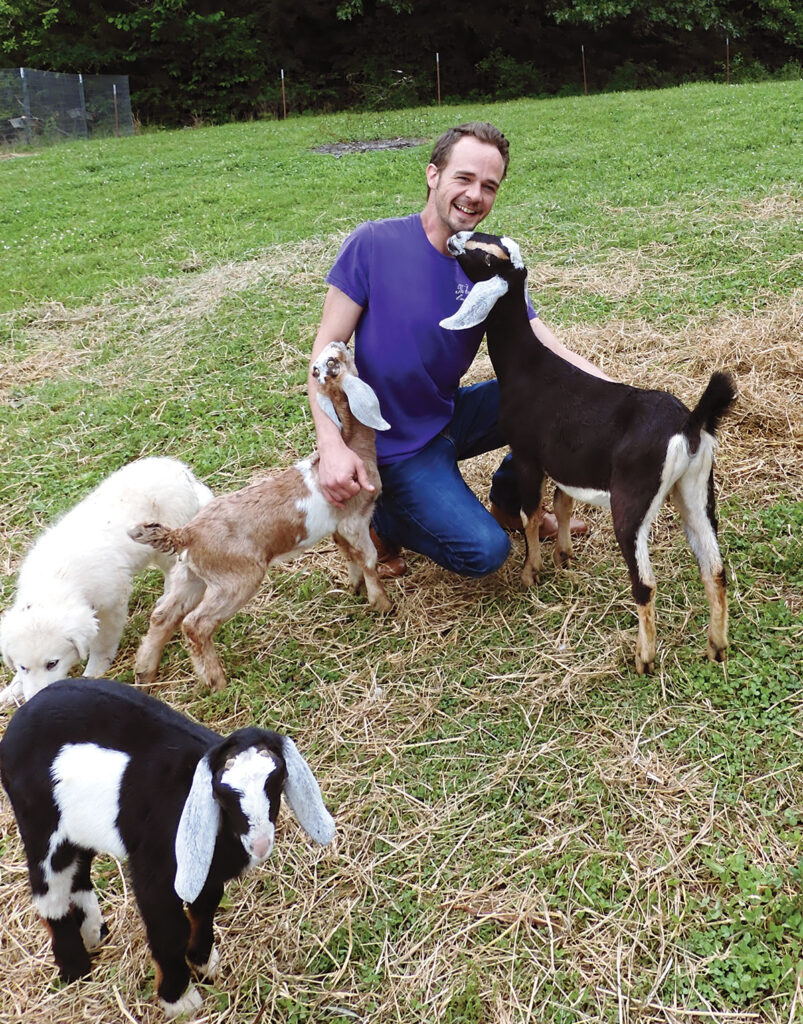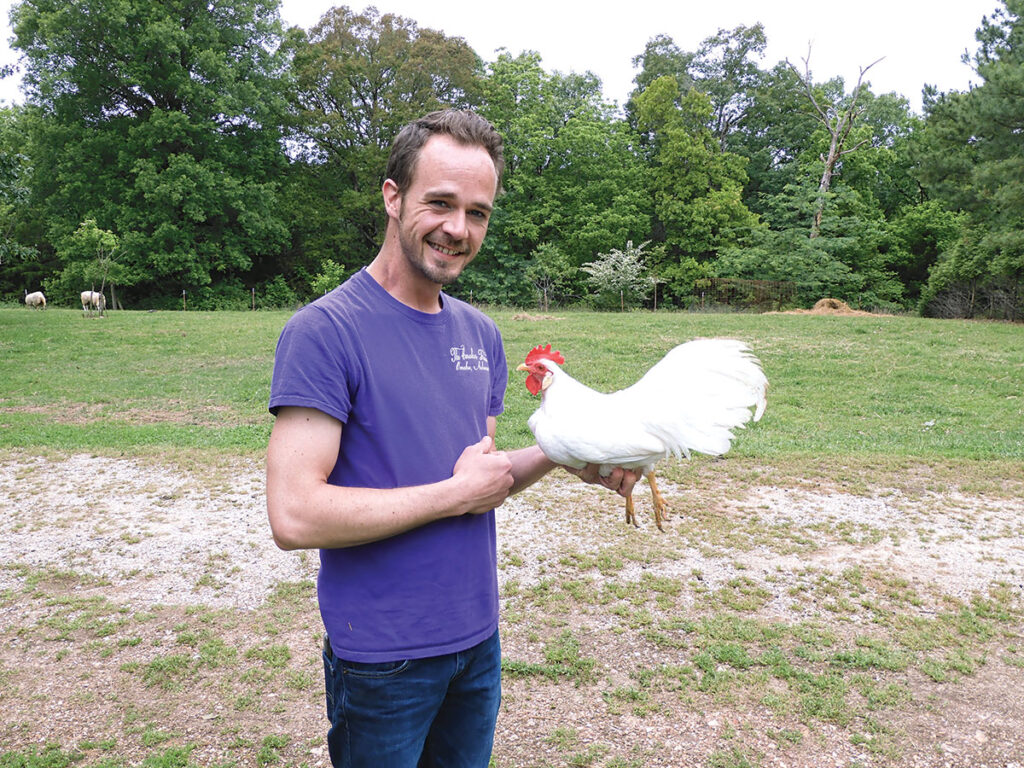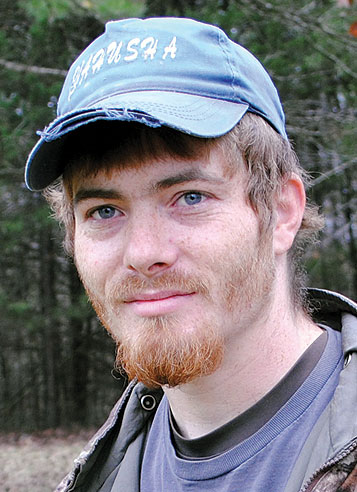
Branson, Mo., entertainer brings his farming operation to the Ozarks
OMAHA, ARK. – From a very early age, Brian Caraker, now of Omaha, Ark., was empowered by strong passions for both raising animals and entertaining people.
He clearly remembers playing with toy farm animals, fences and barns with his parents Bob and Betty Caraker when he was a toddler and being frustrated when his father had a toy horse jump a fence and then to the top of the barn. Indignantly, Brian wanted no part of fanciful imagination. He wanted his animals to be real, with plastic being okay as long as they behaved normally.
At the age of 7, Brian began playing the oboe. He listened, imitated, and rehearsed songs from classic movie musicals and had his first public singing debut when he was 10 when his elementary school staged a musical revue. His teacher wanted him to play Jimmy Durante, which he thought was impossible, but the teacher insisted. He went home and looked at the old Jimmy Durante clips and practiced. His performance was a success, and immediately ignited a passion not only for animals but for entertainment as well.
Bob and Betty raised and showed Appaloosa horses in Illinois throughout Brian’s childhood. However, his deep love for animals exploded when he was 9. He purchased a commercial market lamb because horses were so big they intimidated him and because his cattle-raising neighbor said calves were too big as well.
Bob was insistent Brian work to pay for the lamb himself, so the two of them picked up aluminum cans on Saturdays and took them to a recycling center to redeem for money.
Then his father said Brian could keep his new lamb if he watered and fed her twice a day until show time. Being a typical kid, he was conscientious but not perfect. He and his lamb Waddles had a successful show at the county fair that year. Then his father asked if he had signed up for the youth auction, and young Brian was shocked because he loved his lamb. His father then asked if he had fed Waddles twice a day, every day as they agreed. The boy tipped his cowboy hat over his face as he sold his beloved lamb, believing his life was over and his father so cruel.
However, the following spring, Bob took Brian to purchase his first registered Hampshire ewe with the money he earned selling his lamb. He loved the breed because Hampshires were not only big with black faces and legs but also had beautiful wool on their faces. Then, to Brian’s surprise, Bob bought him a second lamb with the pair becoming seedstock for his current Hampshire herd. That year Honey won grand champion ewe at the Union County Fair, reinforcing his understanding of the value of consistent and hard work. As importantly, Brian also won champion showman, which taught him that his love for his sheep and their affectionate willingness to work with him during the show was as important as hard work.
Eventually Brian added dairy goats and chickens. Early on, he won a show with a White Leghorn Bantam hen and fell in love again. His passion was so deep that he began studying every breed, easily passed the stringent judging exam and became a general licensed judge in 2015.
Through the years, Brian performed in countless musicals and operas in addition to studying classic films and music.
After graduating high school, Brian kept his sheep and chickens at the family farm while attending Millikin College in Decatur, Ill. He began studying opera as his major and then switched to musical theater.
Brian left college to pursue his professional career, which began with playing Riff in “West Side Story” at the McLeod Summer Playhouse in Carbondale, Ill.. He has performed in over 40 musical productions and served as the executive president of the Anna Art Center in Anna, Ill., his hometown, and was founder of the performing arts program.

Eventually, in 2013, Brian was persuaded by good friend Linda Rushing Ashley to audition for Number 1 Hits of the 60s show in Branson, Mo. He was not hired but was called back when the new performer did not work out as planned. He’s been a Branson regular ever since. Brian now works at the King’s Castle Theater.

As much as Brian loved his entertainment career, there was a void. His parents gladly maintained his sheep and chickens, but visits home only increased that void. He was living unhappily in a Branson apartment and needed to farm as much as entertain and began the search in 2016.
Brian searched real estate websites without expecting to find much in his price range. Then one morning he got notification of a new listing in Omaha, Ark., and decided to visit because the farm reminded him of home. He took one look at the mountain valley view, old growth trees and the peaceful atmosphere and told the realtor he wanted to purchase the 20 acre farm and home.
Brian currently raises Hampshires, in addition to Border Cheviot sheep, which is a dual-purpose heritage breed going back to the 1300s.
Brian has 25 breeding ewes, as well as stud rams and lambs. Some are sold as show animals and some for meat. During breeding season, brood ewes receive a 12 percent protein stock pellet, and young lambs are fed a 20 percent protein lamb ration. Because sheep do not imprint as easily as goats, if a ewe is lost, the lamb will be raised by a goat readily available from Brian’s registered Nubian, Saanen and La Mancha dairy goat herd.
Goat milk is highly nutritious and offered to all the farm animals, including Saxony ducks, a rare breed of German origin with a striking tan and ivory color pattern, and eye stripes, with males displaying powder blue, and claret markings that are most visible and vibrant in the fall.

Brian’s goat herd comprises finely tuned genetics from nationally-recognized bloodlines, with every effort made to place kids in show homes where they will eventually be used for breeding and herd development. His goats are quite prolific, producing twins, triplets and a few quadruplets. In 2018, he had three does kid simultaneously, with 11 kids between them.
“The management at King’s Castle Theatre is very understanding of my agricultural life, especially during lambing and kidding season when I frequently arrive late or miss practices,” Brian said. “Without them, I could not lead the life I need to.”
Brian milks twice a day and is often found milking at midnight because missing a milking means udders will not have the development essential for successful showing. Unlike the sheep, the goats have a more intensive feeding regimen, with the milking stock receiving 12-percent stock pellets, dried beet pulp shreds, alfalfa pellets and Calf-Manna, a performance supplement high in protein with a pleasant anise flavor. The goats are also given as much hay as they can consume to supply constant roughage.
The biggest challenge with both ruminant herds is control of barber pole worms, a tropical species that flourishes in Arkansas’s wet, humid climate. Additionally, many winters are not cold enough to kill all the worms which means the strongest survive and propagate. The hardy parasites have built up a resistance so that treatment requires using multiple dewormers simultaneously.

Brian also raises, and shows 12 varieties of chickens and is a master breeder of the White Leghorn Bantam and half way to becoming a master with Rhode Island Red Bantams. In 2015, Brian won Reserve National Champion Rhode Island Red Bantam. Brian’s status as a breeder and judge prompts calls from across the country to inquire about purchasing birds, and hiring him to judge their shows. He now has a hefty following on Facebook as well as through the Caraker Farm website.
An advantage of Brian’s multi-species farm is that the species don’t need to be separated but rather are mixed together in pastures. Sheep are grazers while goats browse with the chickens fertilizing and scratching thereby reducing the flea, tick and lice populations. All the animals are happy being together and are just as happy when Brian comes home when they all crowd around like a large, diverse and contented family.
“My entertainment and farming dreams have blended which allows me to live in the moment and have the time to watch the babies play and the grass grow,” divulged Brian. “God has been instrumental throughout my life, helped fit the pieces together, and made this unique and wonderful lifestyle possible.”








